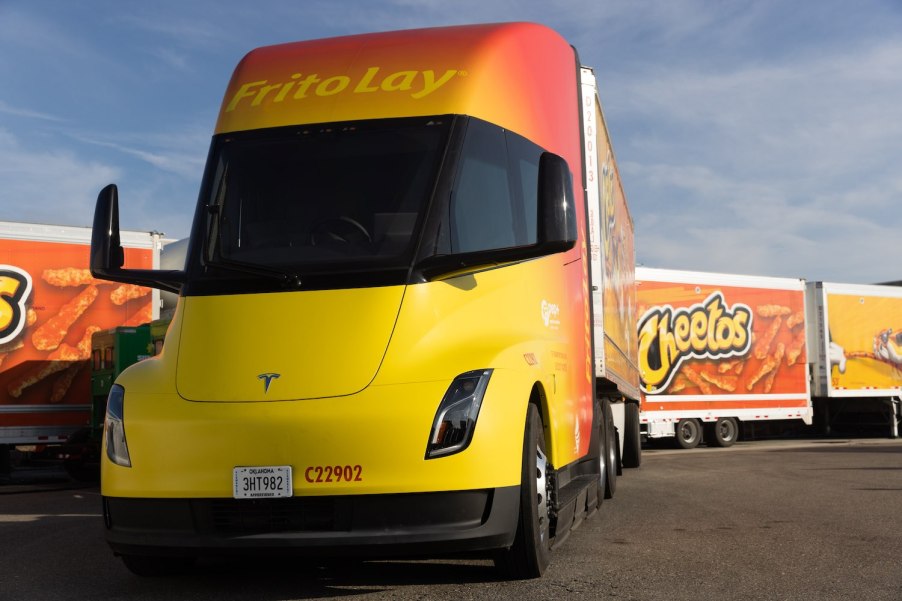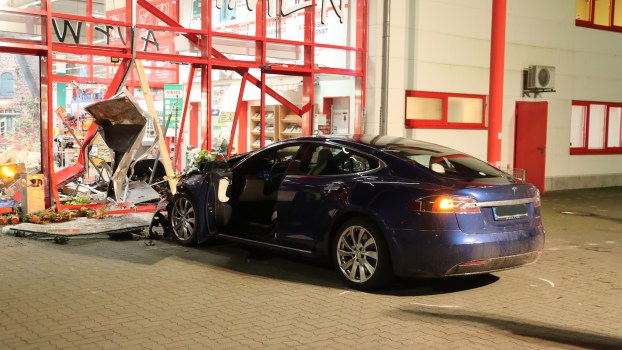
Can Tesla Semi Trucks Haul Anything Heavier Than Potato Chips?
Tesla made a splash when it promised to “disrupt” the trucking industry with its electric semi-truck. The automaker claimed the $200,000 vehicle “can travel up to 500 miles on a single charge.” PepsiCo was among the first buyers and is using the electric trucks to haul trailers of Frito Lay potato chips 425 miles. But when it needs to haul Pepsi sodas, the company limits its trips to under 100 miles. So, does the Tesla semi truck have enough juice for long hauls with anything heavier than potato chips? Does it even matter?
Tesla builds an electric semi-truck

First things first: even EV enthusiasts may not know that Tesla is taking on the trucking industry. The automaker first revealed a semi-truck concept vehicle in 2017. After some production delays, Tesla was finally able to deliver the first tri-engine semi-trucks in December 2022.
Like many electric vehicles, the Tesla semi-truck’s price hinges on the size of its most expensive component: its lithium-ion battery pack. When it first unveiled the truck, Tesla announced a $150,000 price for a trim with a 300-mile range. The version with a 500-mile range was advertised at $180,000.
But these aren’t the only trim levels available. Elon Musk also announced a Founder’s Series Semi starting at $200,000. He was banking on companies’ willingness to pay a bit extra to be seen as the first corporations using sustainable electric semi-trucks. And he was right. PepsiCo was among the first customers to accept delivery of its 36 Tesla Founder’s Series Semi.
Towing with an EV limits its range

Folks who often tow with internal combustion pickup trucks won’t be shocked to hear that towing a heavy trailer reduces an electric truck’s range. Many owners find that a diesel or gas pickup truck that can get 20 mpg falls to 10 mpg while pulling a heavy trailer. These numbers are actually a decent predictor of an electric truck’s towing range.
When TFL Truck got its hands on the Rivian R1T, its reviewers immediately hooked the market’s first electric pickup truck up to an 8,100-pound trailer. They found its predicted 280-mile range immediately fell to 135 miles.
PepisCo’s Vice President told CNBC the company will use some of its trucks to haul loads of various Frito-Lay chip products 425 miles. But when the same trucks are hauling Pepsi soda products, their trip length will be limited to about 100 miles.
Long-haul towing will be one of the final industries to electrify
When PepsiCo announced the above numbers, some naysayers claimed Teslas couldn’t haul anything heavier than potato chips. The truth is a bit more complicated; obviously, the Tesla semi-trucks can pull a trailer of heavier products, but not far. And this previews the role electric vehicles will play in shipping for the foreseeable future.
It takes a long time to recharge an electric semi-truck. So they are not yet the best tool for hauling heavy loads long distances. And honestly, until we develop a battery better than lithium-ion, they may not be. But they still have an important role to play in trucking.
Electric delivery vehicles are an excellent tool. A fleet operator knows exactly how much range a delivery vehicle driving a set route will need. They can charge it at their facility every night. The low cost of electricity and repairs keeps the all-important cost per mile low.
A delivery EV would also reduce the noise and emissions in city centers. Finally, it advertises that the corporation using it is investing in sustainable technologies. Unsurprisingly, Amazon has pledged to buy 100,000 electric delivery vans.
So, while the Tesla Semi-Truck may not be capable of long hauls with anything heavier than potato chips, it hardly matters. These electric trucks best use may be as a low-range, local delivery vehicle anyway.
Next, find out why Pepsi’s Tesla semi-trucks have been seen stranded by the roadside, or learn more about the trucks’ true capabilities in the video below:






